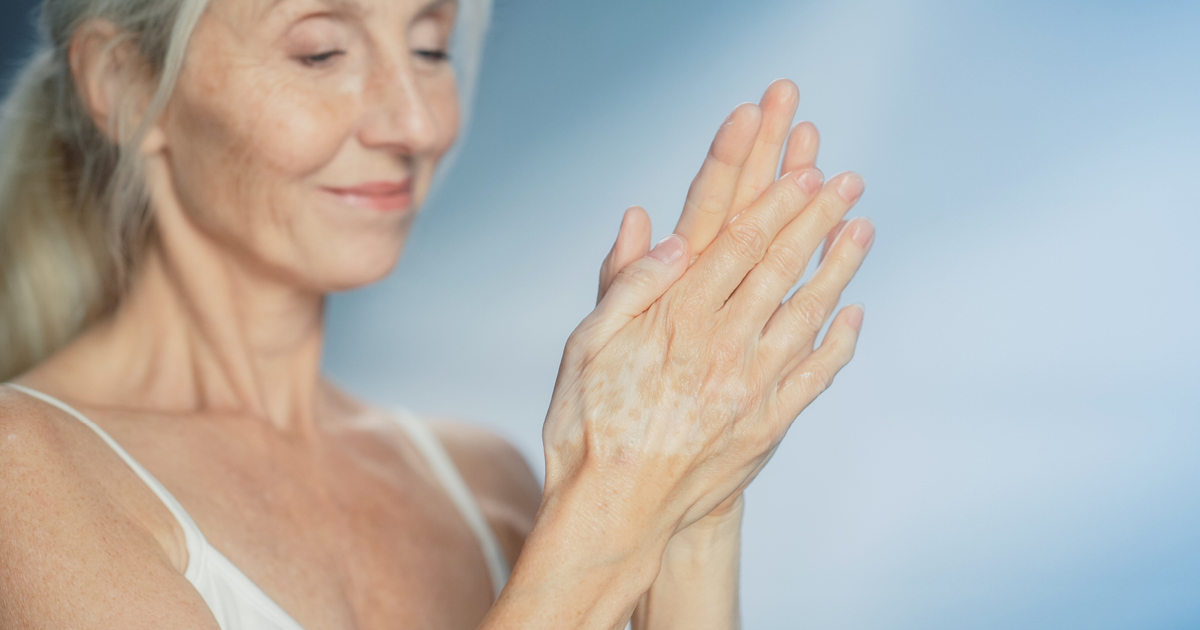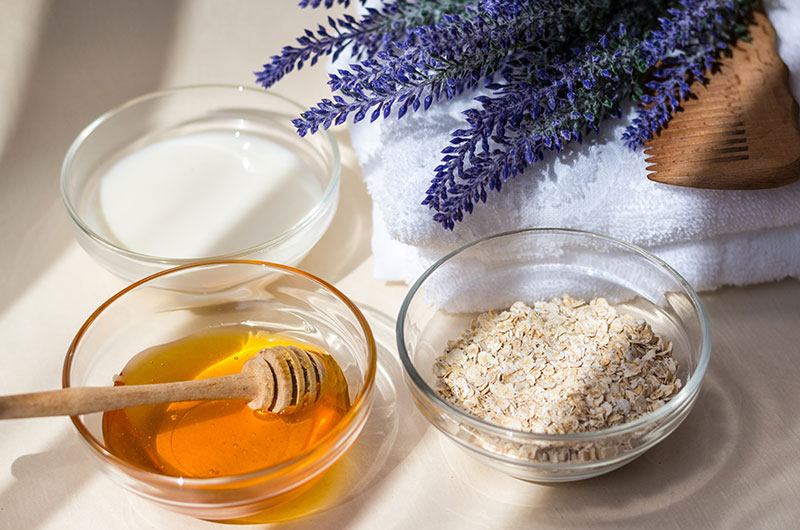Expert Advice

Acella Pharmaceuticals, LLC., is partnering with Heather Procknal, NBC-HWC-CHC, to bring greater awareness to the importance of thyroid care and education. This post was sponsored by Acella Pharmaceuticals and should not be construed as medical advice. Please talk to your doctor about your individual medical situation.
Disclaimer: The information provided is for educational purposes only and does not substitute for professional medical advice. Consult a medical professional or health care provider before beginning any exercise, fitness, diet, or nutrition routine.
If you’ve ever suffered from dry, itchy skin, you know how uncomfortable it can feel. Add an underactive thyroid to the mix, and you could have dry skin plus other symptoms.
Hypothyroidism is characterized by an underactive thyroid gland. This gland is responsible for regulating the body’s metabolism, including the production and turnover of skin cells.
When the thyroid hormone isn't performing well, the skin may become flaky, dry, and itchy. In this article, I’ll explore why hypothyroidism causes dry skin and provide practical tips to combat this bothersome symptom.
How Does Hypothyroidism Cause Dry Skin?1
With insufficient thyroid hormones, the body’s metabolism slows down, and this sluggishness affects not only moisture but reduced blood flow to the skin. The eccrine glands, responsible for sweat secretion, are also affected by low thyroid hormone levels. This further deprives the skin of essential nutrients and moisture.
To combat dry skin caused by hypothyroidism, it is important to first address the underlying thyroid issues. Consult with a health care professional who can diagnose and provide appropriate treatment options, such as thyroid hormone replacement therapy.
In addition to medical attention, some self-care measures can help. Below are some tips for preventing and relieving the itch while keeping your skin healthy and hydrated!
Triggers That May Worsen Dry Skin from Hypothyroidism
For individuals with underactive thyroid function, skin care products being used, everyday behaviors, and even the weather can exacerbate already compromised skin.
Harsh Skincare Products
Harsh cleansers and alcohol-based products can strip away the skin's natural oils, exacerbating dryness. It's important to choose gentle, hydrating products specifically designed for dry and sensitive skin.
Hot Water
One common trigger is hot water. Prolonged exposure to hot water can strip the skin of its natural oils, leaving it dehydrated. It’s recommended to use lukewarm water and limit shower duration to prevent moisture loss. It's tempting to indulge in a long, hot shower, but at what cost to your skin?
Cold Weather
Cold air is less humid and can increase moisture evaporation from your skin. Using a humidifier in your home can add moisture to the air and help alleviate dry skin.
Dehydration Keep a close eye on your water intake to avoid worsening dry skin.
Self-Care Measure to Help Combat Dry Skin
Hydrate Using Nutrition
Proper hydration supports overall health and contributes to maintaining healthy skin.
Here are some tips to help you hydrate your skin through food and drink:
1. Drink plenty of water. Aim to drink at least eight glasses of water per day. Staying properly hydrated helps keep your skin moisturized and promotes overall skin health.
2. Eat water-rich foods. Fruits and vegetables such as watermelon, cucumber, oranges, and strawberries are excellent choices. These foods not only hydrate your body but also provide essential vitamins and antioxidants for healthy skin. Check out these refreshing, thyroid-friendly summer salads.
3. Consume omega-3 fatty acids. Include foods such as fish, flaxseeds, and walnuts in your diet. These healthy fats help to nourish the skin and promote better skin hydration. Here’s a delicious recipe rich in omega-3s.
4. Limit caffeine and alcohol. Both caffeine and alcohol can dehydrate your body, leading to dry skin. Instead, opt for alternatives such as herbal teas or infused water. Read more about how an alcohol hiatus can support liver and thyroid health.
Choose Products Specifically Made for Dry Skin
When combatting dry skin caused by hypothyroidism, it's important to be mindful of the body care products you use.
Look for skincare products free from fragrances, alcohol, and other potentially irritating ingredients. Instead, select products containing moisturizing ingredients such as shea butter, coconut oil, and almond oil. These natural emollients help hydrate and nourish the skin, leaving it soft and supple.
Gently Exfoliate
Exfoliating helps remove dead skin cells and encourages the growth of new, healthy skin cells. However, it is important to exfoliate safely and gently to avoid further damage or irritation.
First, choose gentle exfoliators formulated for sensitive or dry skin. Avoid harsh scrubs or exfoliating brushes.
Next, exfoliate your skin with light pressure in circular motions. Focus on areas that are particularly dry or flaky but be careful not to scrub too hard. Over-exfoliating can strip away your skin's natural oils. After exfoliating, use a moisturizer.
Lock in Moisture Right After Bathing
After showering, gently pat your skin dry with a towel, leaving it slightly damp. Then, apply a generous amount of moisturizer all over your body. Massage it into your skin using circular motions to help it absorb better. Pay special attention to areas prone to dryness, such as your elbows, knees, and feet.
For optimal results, moisturize your skin daily, even when you don't shower. Daily moisturizing will help keep your skin hydrated and minimize dryness and itchiness.

Easy DIY Recipe for Dry Skin
Deeply Hydrating Homemade Oatmeal and Honey Mask
If you're experiencing dry skin due to hypothyroidism, here's an oatmeal and honey mask recipe that may provide much-needed hydration.
To create this mask, you'll need two tablespoons of oats. Use a blender to turn the oats into a fine powder. Then, mix the powdered oats with one tablespoon of honey until it forms a paste. If needed, add a little warm water to thin out the mixture.
Next, apply the mask to your face, spreading it evenly and avoiding the delicate eye area. Leave the mask on for 15 minutes to 20 minutes to allow the ingredients to work their magic.
Finally, rinse off with lukewarm water and pat your skin dry. Remember to apply a nourishing moisturizer right after to lock in all that hydration.
Why Use Oats and Honey?*
Oats are known for their moisturizing and soothing properties, while honey provides hydration and antioxidant protection.2-4 This simple recipe may help combat dryness and provide some relief.2-4
Remember to consult with your health care professional if you have any concerns or if your symptoms persist. Take care of your skin and enjoy the benefits of this nourishing and easy-to-make oatmeal and honey mask.
REFERENCES: 1. Safer JD. Thyroid hormone action on skin. Dermatoendocrinol. 2011 Jul;3(3):211-5. doi: 10.4161/derm.3.3.17027. Epub 2011 Jul 1. PMID: 22110782; PMCID: PMC3219173. https://www.ncbi.nlm.nih.gov/pmc/articles/PMC3219173/. 2. Reynertson, K. A., Garay, M., Nebus, J., Chon, S., Kaur, S., Mahmood, K., Kizoulis, M., & Southall, M. D. (2015). Anti-inflammatory activities of colloidal oatmeal (Avena sativa) contribute to the effectiveness of oats in treatment of itch associated with dry, irritated skin. Journal of drugs in dermatology : JDD, 14(1), 43–48. 3. Cerio, R., Dohil, M., Jeanine, D., Magina, S., Mahé, E., & Stratigos, A. J. (2010). Mechanism of action and clinical benefits of colloidal oatmeal for dermatologic practice. Journal of drugs in dermatology : JDD, 9(9), 1116–1120. 4. Burlando, B., & Cornara, L. (2013). Honey in dermatology and skin care: a review. Journal of cosmetic dermatology, 12(4), 306–313. https://doi.org/10.1111/jocd.12058
*Acella Pharmaceuticals, LLC does not endorse, promote or sponsor any products or brands mentioned in this article. The views expressed here are those of the author.
3012-v1
Note that DTE products, including NP Thyroid®, have not been reviewed by the FDA for safety or efficacy.
INDICATIONS AND IMPORTANT RISK INFORMATION, INCLUDING BOXED
WARNING
Important Risk Information
Drugs with thyroid hormone activity, alone or together with other therapeutic agents, have been used for the treatment of obesity. In euthyroid patients, doses within the range of daily hormonal requirements are ineffective for weight reduction. Larger doses may produce serious or even life-threatening manifestations of toxicity, particularly when given in association with sympathomimetic amines such as those used for their anorectic effects.
- NP Thyroid® is contraindicated in patients with uncorrected adrenal insufficiency, untreated thyrotoxicosis, and hypersensitivity to any component of the product.
- In the elderly and in patients with cardiovascular disease, NP Thyroid® should be used with greater caution than younger patients or those without cardiovascular disease.
- Use of NP Thyroid® in patients with diabetes mellitus or adrenal cortical insufficiency may worsen the intensity of their symptoms.
- The therapy of myxedema coma requires simultaneous administration of glucocorticoids.
- Concomitant use of NP Thyroid® with oral anticoagulants alters the sensitivity of oral anticoagulants. Prothrombin time should be closely monitored in thyroid-treated patients on oral anticoagulants.
- In infants, excessive doses of NP Thyroid® may produce craniosynostosis.
- Partial loss of hair may be experienced by children in the first few months of therapy but is usually transient.
- Adverse reactions associated with NP Thyroid® therapy are primarily those of hyperthyroidism due to therapeutic overdosage.
- Many drugs and some laboratory tests may alter the therapeutic response to NP Thyroid®. In addition, thyroid hormones and thyroid status have varied effects on the pharmacokinetics and actions of other drugs. Administer at least 4 hours before or after drugs that are known to interfere with absorption. Evaluate the need for dose adjustments when regularly administering within one hour of certain foods that may affect absorption.
- NP Thyroid® should not be discontinued during pregnancy, and hypothyroidism diagnosed during pregnancy should be promptly treated.
Indication
NP Thyroid® (thyroid tablets, USP) is a prescription medicine that is used to treat a condition called hypothyroidism from any cause, except for cases of temporary hypothyroidism, which is usually associated with an inflammation of the thyroid (thyroiditis). It is meant to replace or supplement a hormone that is usually made by your thyroid gland.
NP Thyroid® is also used in the treatment and prevention of normal functioning thyroid
goiters, such as thyroid nodules, Hashimoto’s thyroiditis, multinodular goiter, and in the
management of thyroid cancer.
Revised 10/2023
